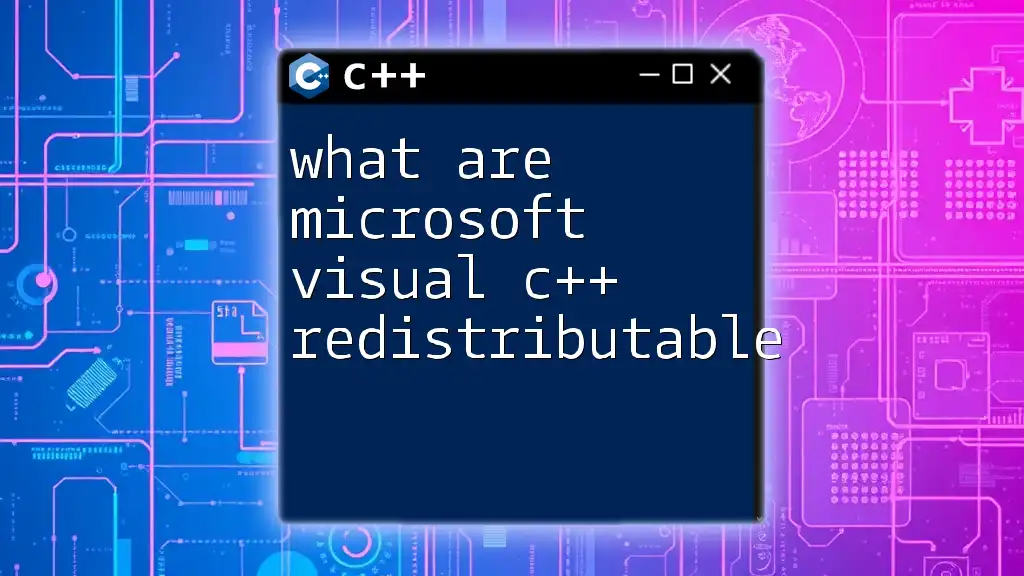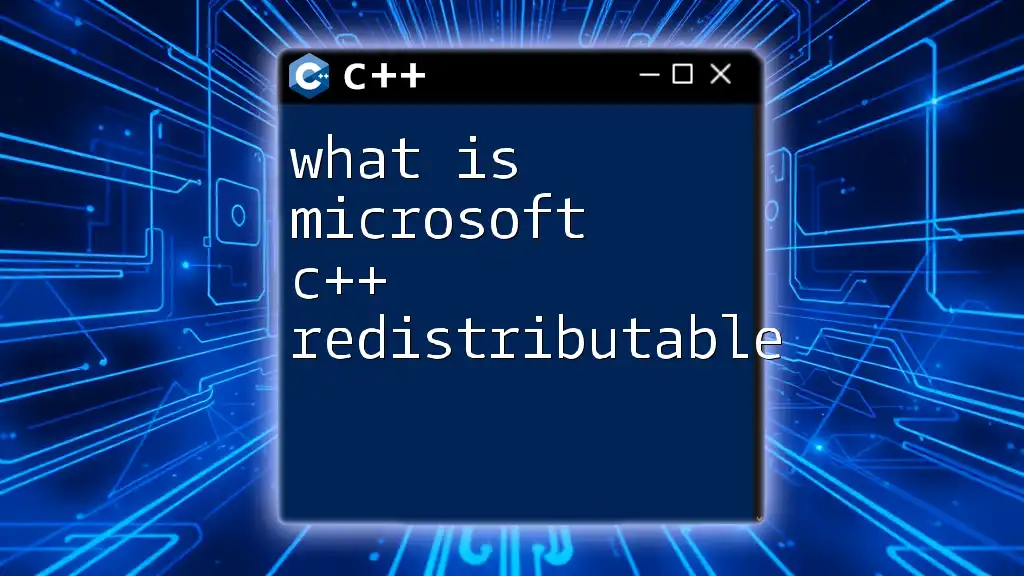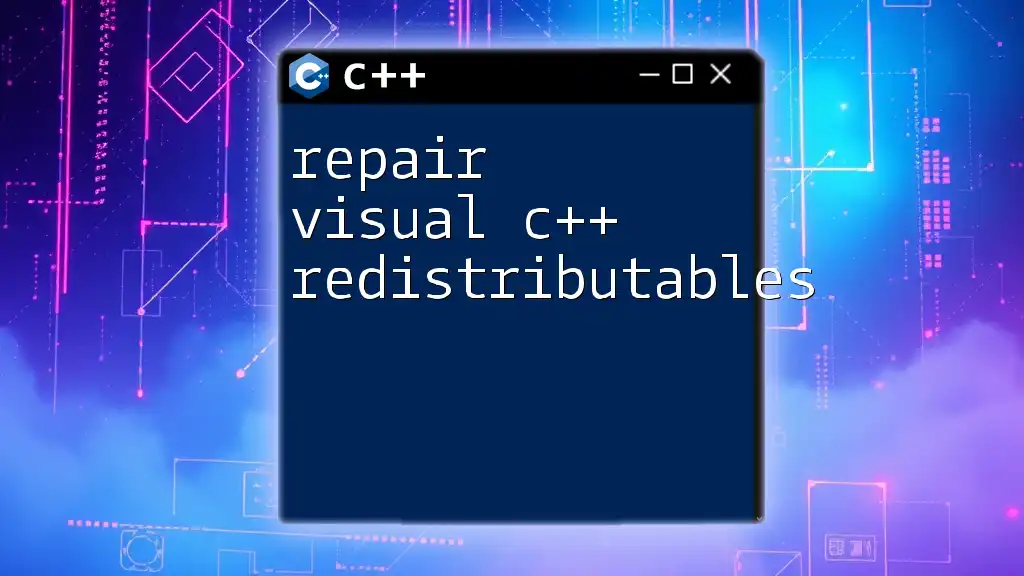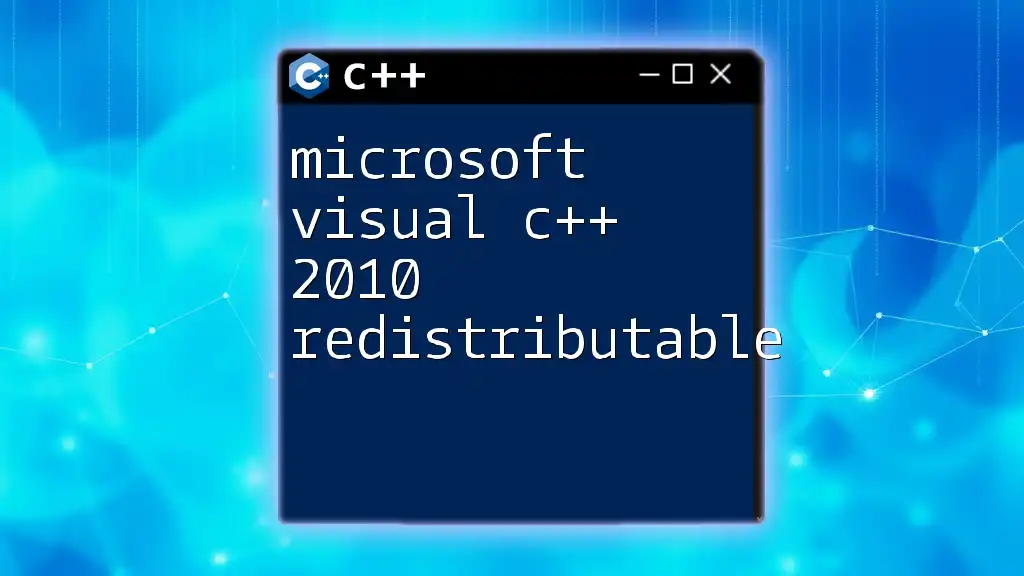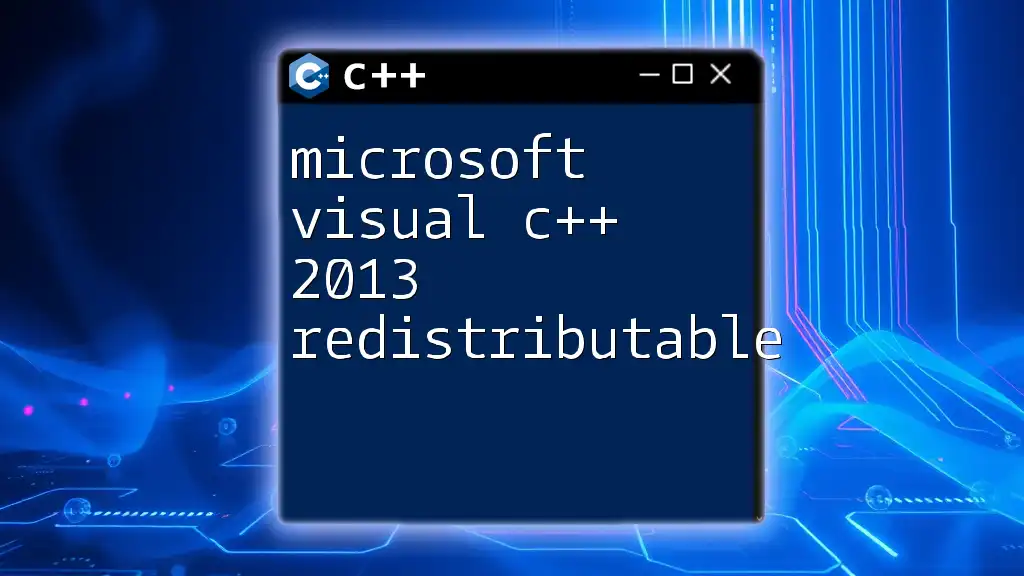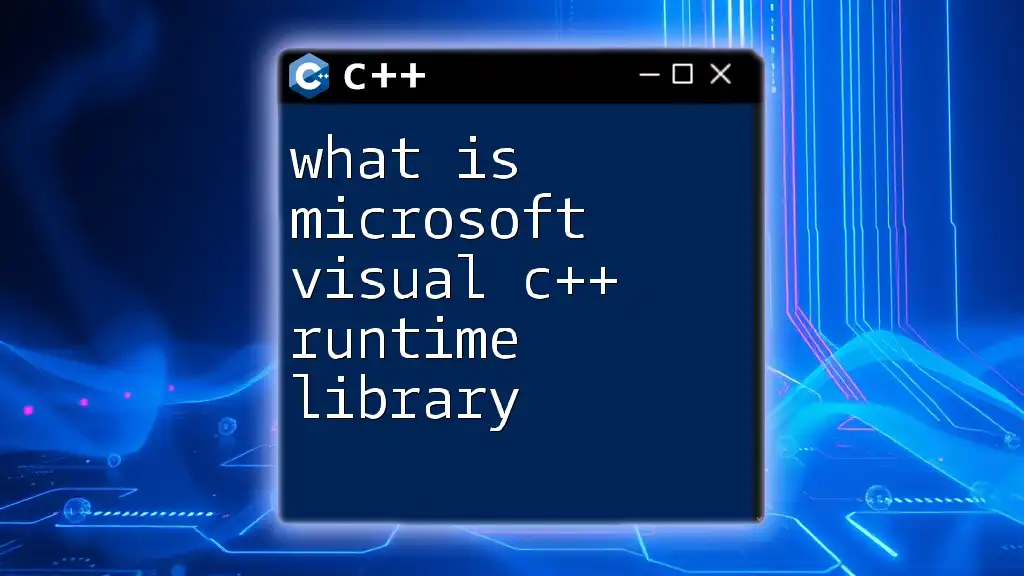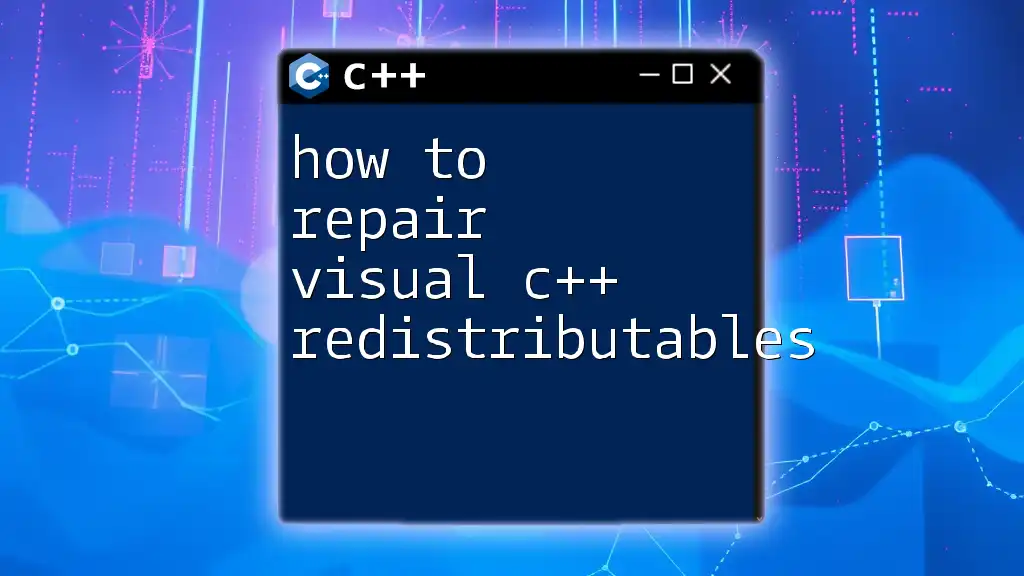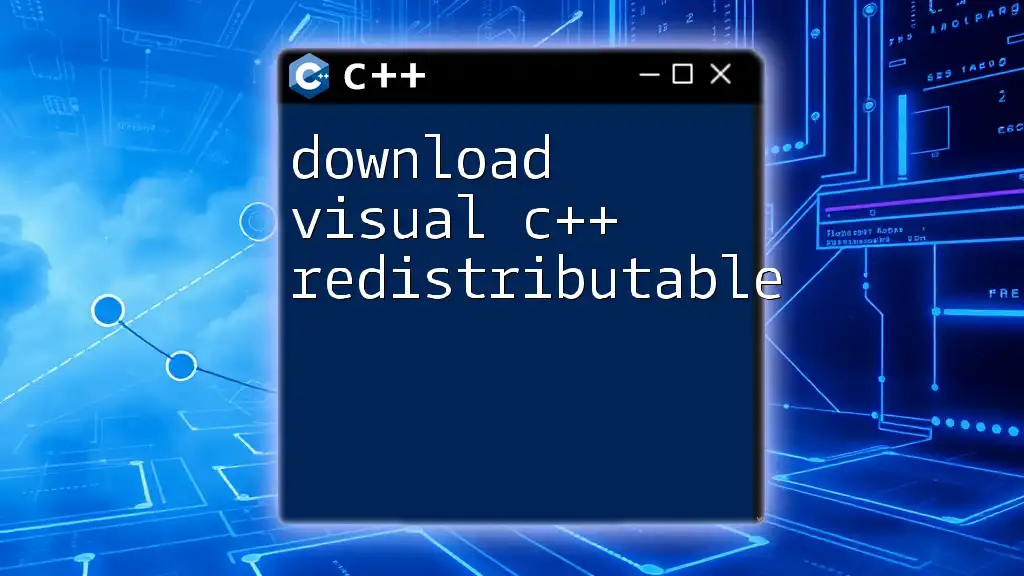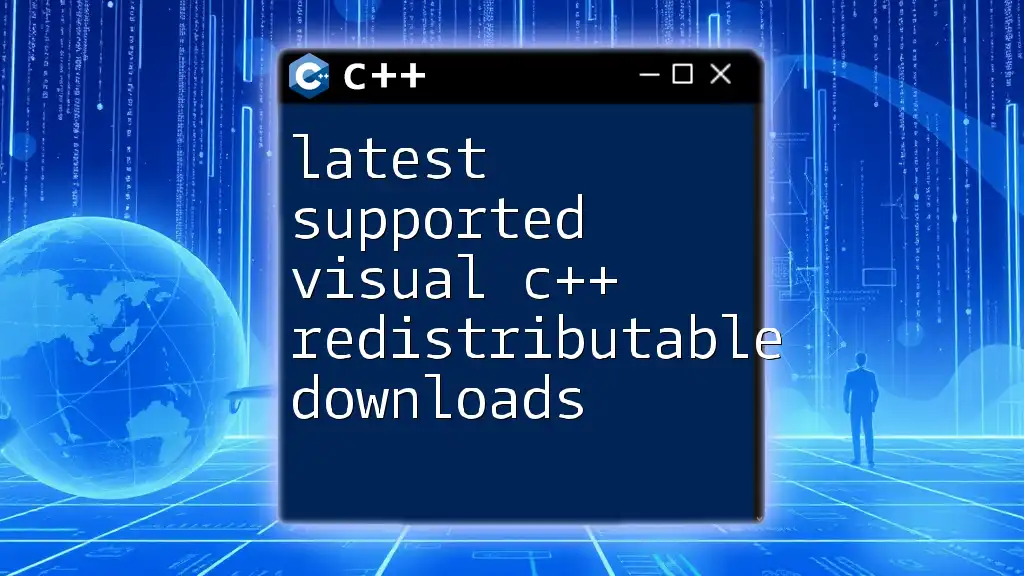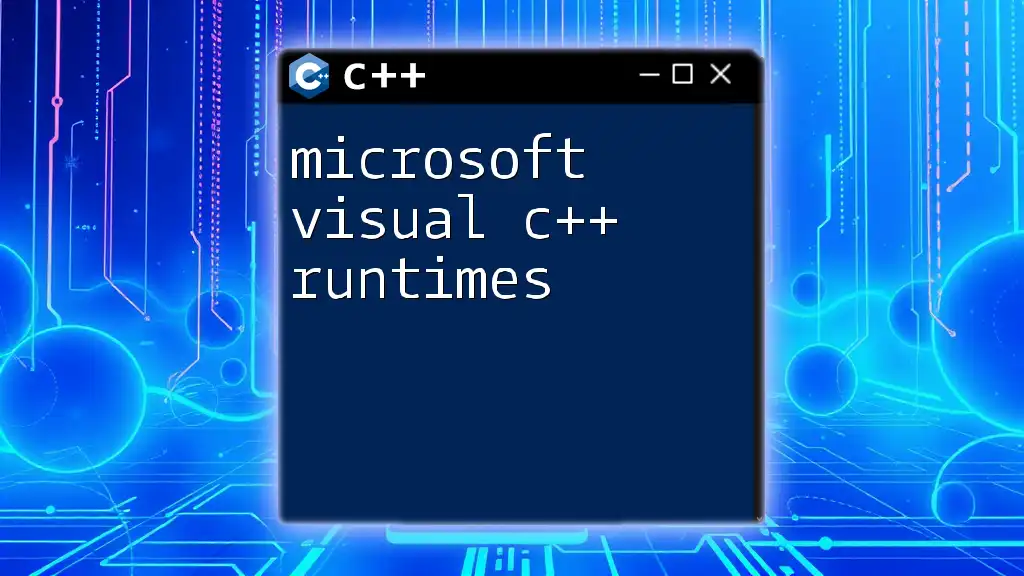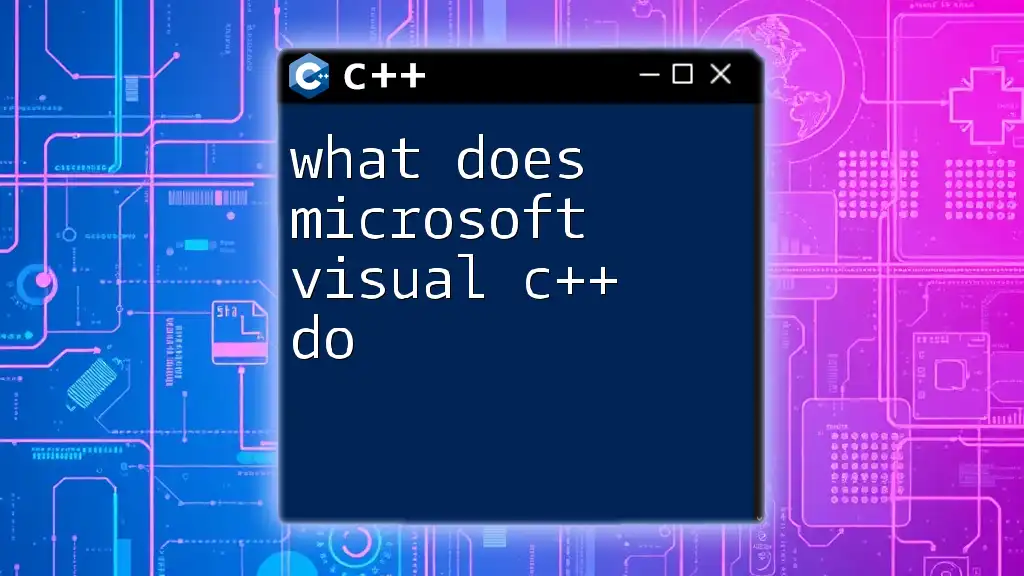Microsoft Visual C++ Redistributable is a set of runtime components that enables applications developed with Visual C++ to run on computers that do not have Visual C++ installed.
Here’s a simple code snippet showing how you might check if the required redistributable is installed in C++:
#include <windows.h>
#include <iostream>
int main() {
HKEY hKey;
if (RegOpenKeyEx(HKEY_LOCAL_MACHINE, "SOFTWARE\\Microsoft\\VisualStudio\\14.0\\VC\\Runtimes\\x64", 0, KEY_READ, &hKey) == ERROR_SUCCESS) {
std::cout << "Microsoft Visual C++ Redistributable 2015-2019 is installed." << std::endl;
RegCloseKey(hKey);
} else {
std::cout << "Microsoft Visual C++ Redistributable is not installed." << std::endl;
}
return 0;
}
What Is Microsoft Visual C++ Redistributable?
Microsoft Visual C++ Redistributable refers to a set of runtime components that are essential for running applications developed with Microsoft's Visual C++ programming language. These redistributable packages ensure that applications can access the necessary resources from the Visual C++ Runtime Library, which allows them to function correctly on a user's machine. Developers package their software with these redistributables to avoid compatibility issues and to simplify the installation process for end users.
Significance of Redistributables
Redistributable packages play a critical role in ensuring that applications run smoothly across different machines. If an application was developed using a specific version of Visual C++, it will often require the corresponding redistributable to access functions, libraries, and runtime components specific to that version. By providing a common library that can be shared among various applications, redistributables help streamline the application deployment process and reduce redundancy in software installation.
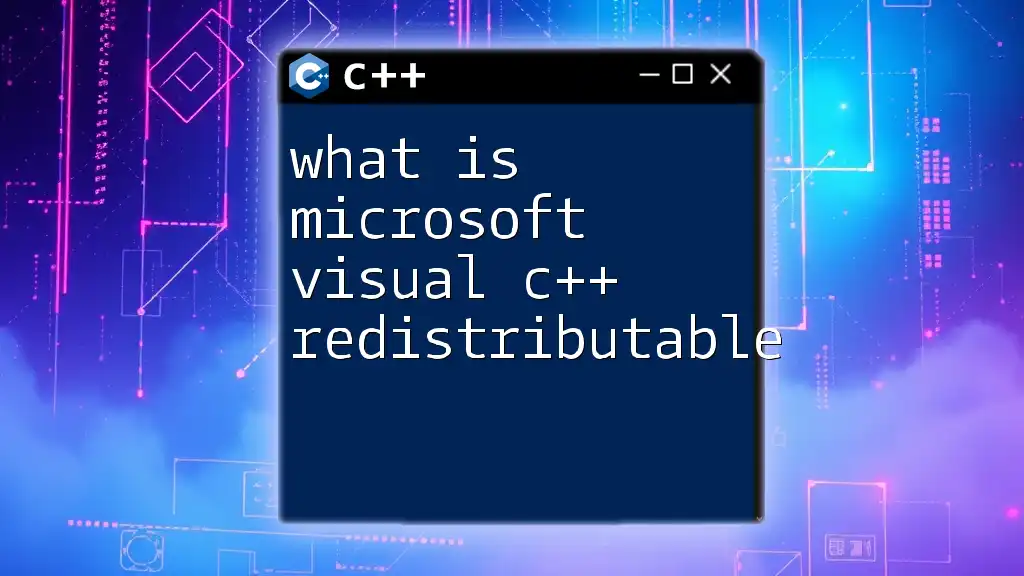
The Components of Microsoft Visual C++ Redistributables
Understanding what is included in these redistributables helps clarify their importance. The main components often found in Microsoft Visual C++ Redistributable packages include:
Runtime Libraries
At the core of the redistributable packages are the runtime libraries. These libraries contain crucial functions and routines that applications depend on during execution. Runtime libraries handle tasks such as memory management, input/output operations, and string manipulation. By ensuring these libraries are available on a user’s system, developers can guarantee that their applications will execute correctly.
DLL Files
Dynamic Link Libraries (DLL) are an essential aspect of the redistributable packages. DLLs allow multiple applications to share the same code, reducing the overall memory footprint. Since redistributables include various DLL files, applications that rely on them can leverage existing code to perform tasks, thus saving both resources and development time. For instance, a common library like `MSVCP140.dll` (from Visual C++ 2015) may be required by various applications built using that version.
Configuration Files
Configuration files included in the redistributable packages play a vital role in managing different versions and settings. These files can specify which versions of libraries should be loaded, ensuring that applications use the correct dependencies even when multiple versions coexist on the system. Using these files effectively can prevent conflicts between different applications and improve stability.
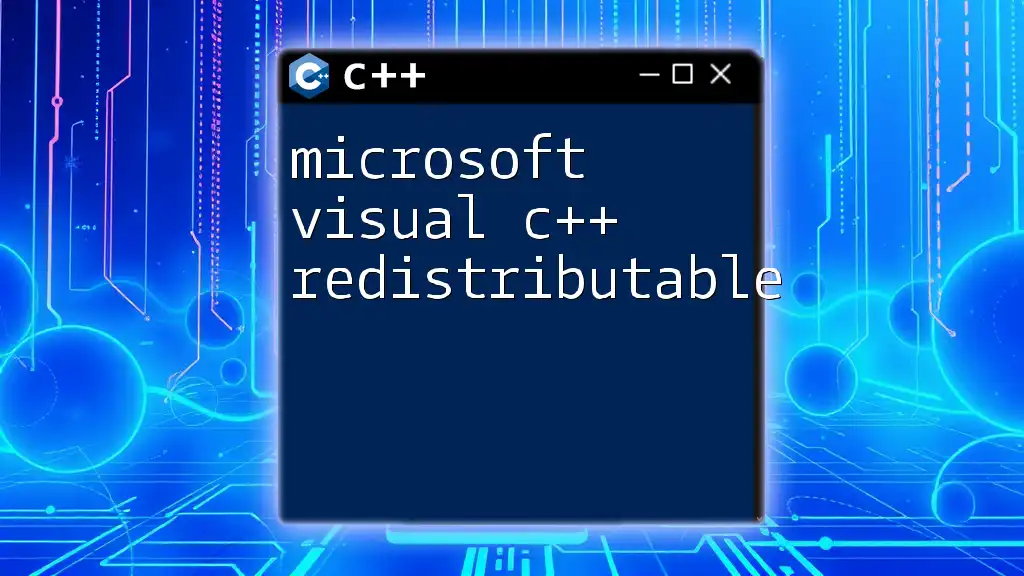
Different Versions of Microsoft Visual C++ Redistributables
The Microsoft Visual C++ Redistributable has evolved over the years alongside the Visual Studio IDE. Understanding the different versions aids in ensuring compatibility.
Visual Studio Versions and Corresponding Redistributables
Each major release of Visual Studio has its associated redistributable package. Here’s a brief overview:
- Visual Studio 2010: Included the Visual C++ 10 Redistributable.
- Visual Studio 2012: Introduced Visual C++ 11 Redistributable, with improvements in C++11 support.
- Visual Studio 2013: Came with Visual C++ 12 Redistributable.
- Visual Studio 2015: Launched Visual C++ 14 Redistributable, supporting new C++14 features.
- Visual Studio 2019: Updated to Visual C++ Redistributable for Visual Studio 2019, allowing better performance and added support for new platform features.
Comparison of Features
For instance, Visual Studio 2019's redistributables offer advanced optimizations for performance and additional functionalities that enhance security and multithreading support over previous versions. This progress illustrates the importance of using the correct runtime libraries corresponding to the specific Visual Studio version when deploying applications.
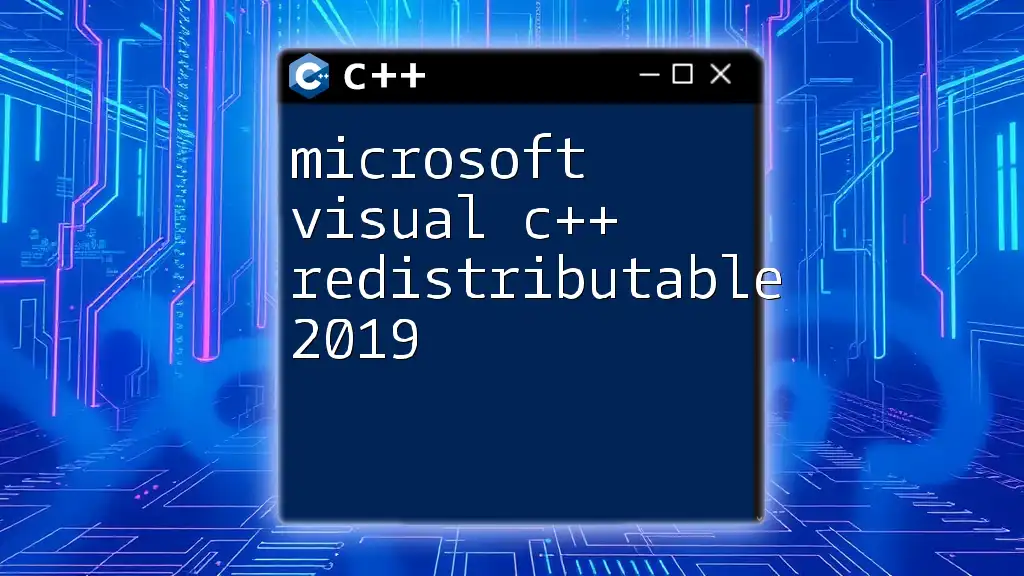
How to Install Microsoft Visual C++ Redistributable
Installing Microsoft Visual C++ Redistributables can be done quickly and easily through the official Microsoft website.
Step-by-step Installation Guide
- Visit the Microsoft Download Center: Begin your process by navigating to the official Microsoft site where redistributables are available for download.
- Select the Desired Redistributable Version: Look for the version that matches the development environment of the application you wish to run.
- Choose the Appropriate Architecture: Make sure to select either the x86 (32-bit) or x64 (64-bit) version, depending on your operating system and application requirements.
- Follow Intuitive Installation Prompts: Run the downloaded installer and follow the straightforward instructions to complete the installation process.
Once installed, users can launch applications that depend on Microsoft Visual C++ without any issues.
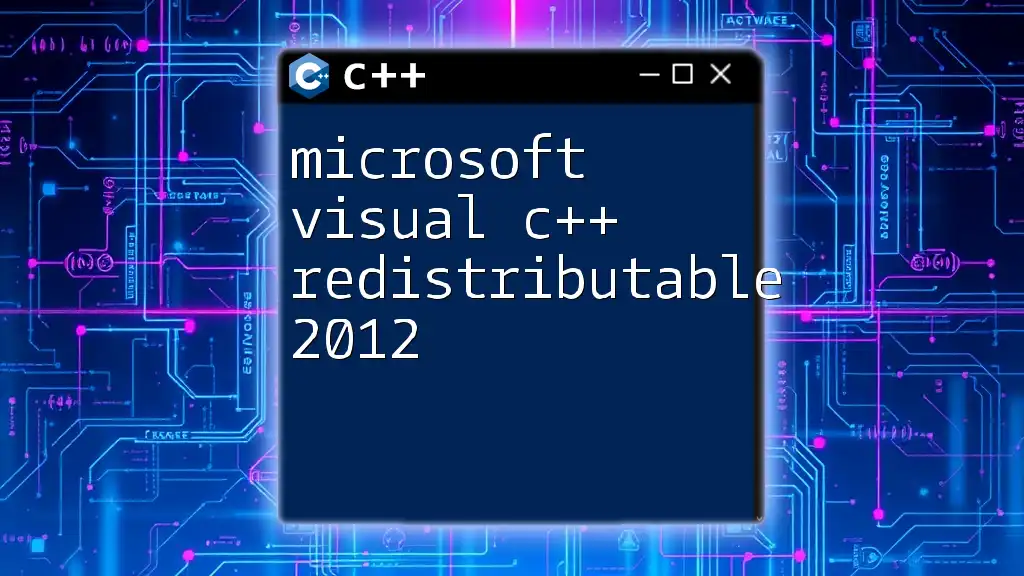
Common Issues and Troubleshooting
Like any software component, users may encounter problems related to Microsoft Visual C++ Redistributables. Understanding common issues can save time and resources.
Missing or Corrupt Files
One common issue occurs when necessary redistributable libraries are missing or corrupted. Users might see error messages such as:
The program can't start because MSVCP110.dll is missing from your computer.
This indicates that the required DLL file, part of the redistributable package, is not present.
How to Fix Common Errors
To resolve such issues, users should consider the following steps:
- Reinstall the Redistributables: Download and install the necessary version of the redistributable package from the official site, which often resolves missing or broken files.
- Using System File Checker (SFC): On Windows, you can use SFC to scan and repair corrupted files by running the command:
sfc /scannow
These solutions can effectively address common error messages related to Visual C++ runtime errors.
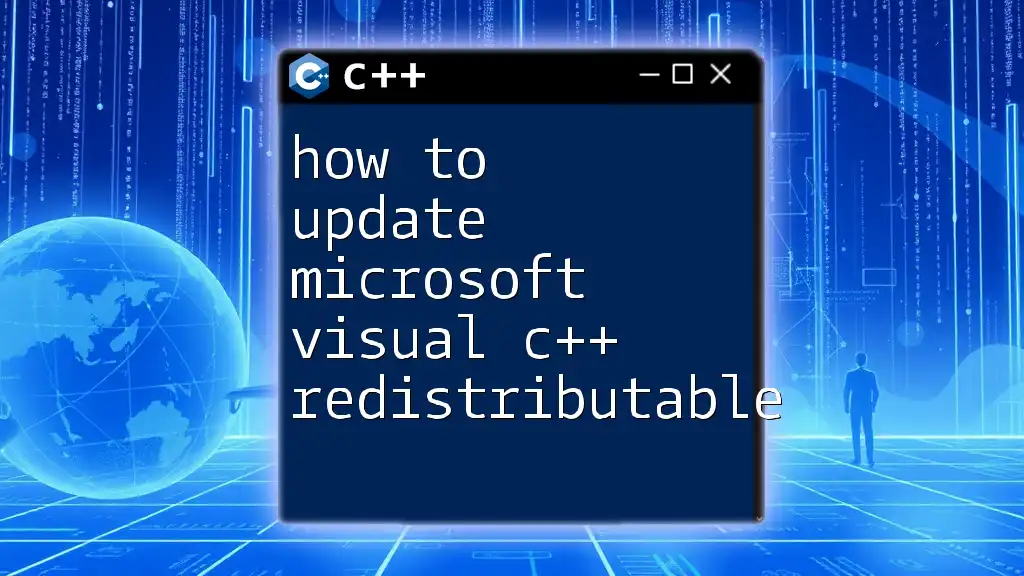
Best Practices When Using Microsoft Visual C++ Redistributable
Developers and users should follow certain best practices to ensure smooth experiences with Microsoft Visual C++ Redistributables.
Versioning Concerns
It's crucial to be conscious of version control when managing redistributables in different environments such as development, testing, and production. Utilizing the correct libraries that match your application’s build version is pivotal in preventing compatibility issues. Additionally, developers should consider utilizing manifest files to ensure the appropriate versions of libraries are automatically initialized when an application runs.
Packaging Applications
For developers aiming to streamline the installation for end users, packaging redistributables with their applications is an efficient approach. This can be achieved through tools like Inno Setup or InstallShield, which allow developers to bundle the entire application along with the required redistributables into a single installer. Doing so minimizes the chances of users encountering setup issues and enhances the user experience significantly.
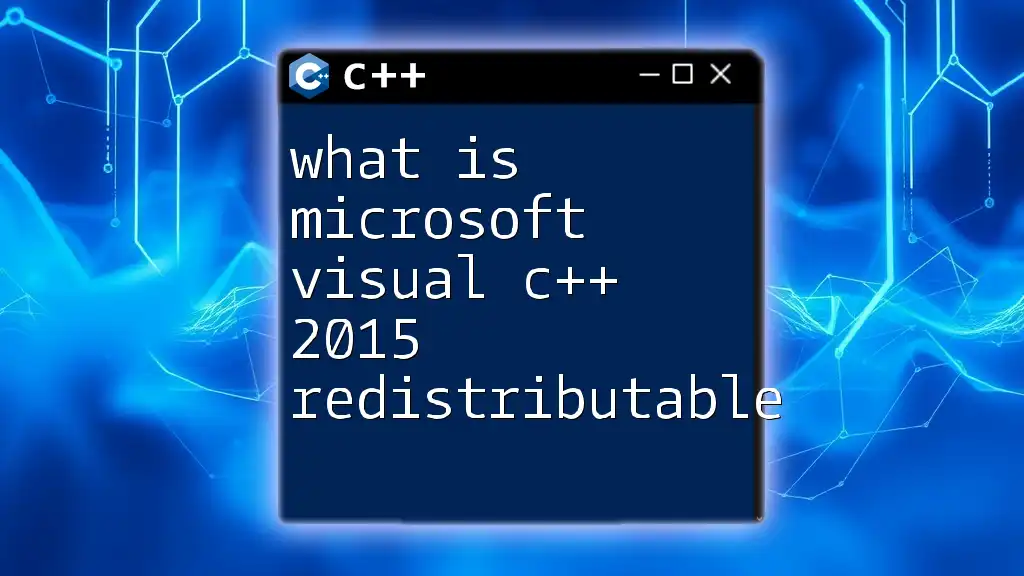
Conclusion
In summary, Microsoft Visual C++ Redistributables are vital components in software development that ensure applications operate as intended. By making certain these redistributable packages are installed correctly, developers can provide users with seamless experiences while maintaining application stability and performance. Understanding and utilizing redistributables effectively is essential for both developers and users in navigating the complexities of modern software environments.
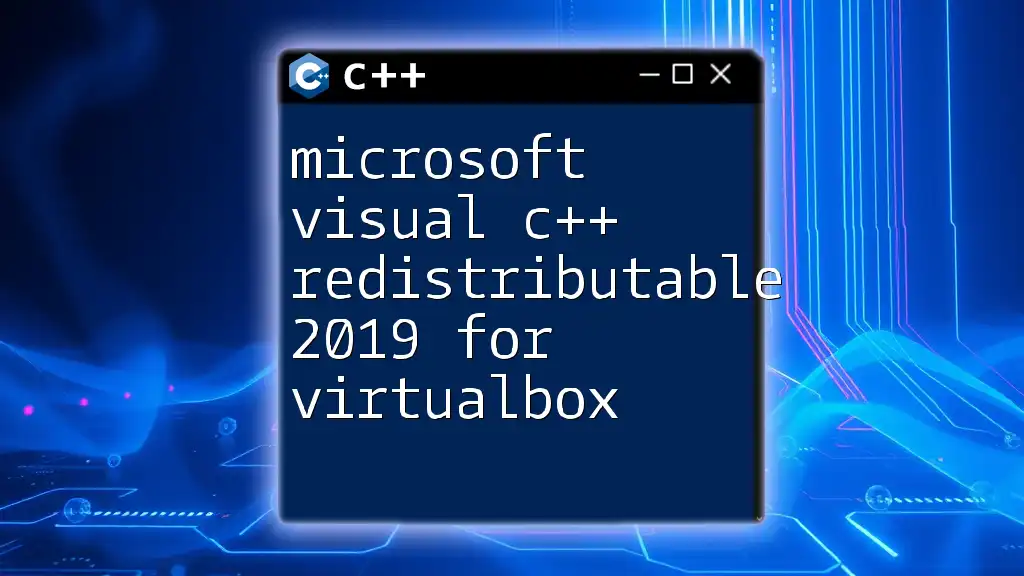
Further Reading and Resources
For those looking to deepen their understanding of Microsoft Visual C++ Redistributables, consult the official Microsoft resources and documentation. There are also many articles and guides that cover related topics within C++ development that can prove helpful.

